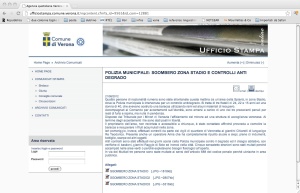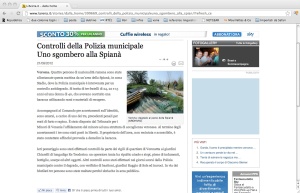spot the difference/2 (and think it over)
This is a slightly different example of how an institutional press release (issued, again, by the City Council of Verona) may be used as a news in itself – with nobody verifying its newsworthiness nor accuracy and trustworthiness.
The forst pic above is a screenshot from the City council of Verona website; the second, a screenshot from a local daily online newspaper.
What’s the story, then?
Local police, committed to taking good care of public decency and cleanness, tidied up this small piece of land (the pic has been published in the Comune di Verona website), evicting three brothers aged 24, 22 and 15 (the last one later taken to a local asylum) and a 40-year-old woman: in short, four Romanian people. No one, anyway, was arrested.
Moreover, the press release tells us that, somewhere along the Adige River, the local police found clothes, bottles, shoes and other stuff, therefore ordering a dustman to clean up fences and flowerbeds.
The last few lines of the release tell us about two other police operations against ‘urban decay’ and a quite incomprehensible ‘home uneasiness’ (in Italian, ‘disagio abitativo’).
In the first one, five foreign homeless people were fined because they were doing their business in public; in the second one, in the city centre, three people were fined as well for being drunk on the streets.
Okay.
Let’s go back to the first piece of news, that about four people – one of them a minor – being pushed away from their shelter.
No one tells us whether or not the 40-year-old woman was the mother of the three boys the police found with her. This would be dramatically important to know: should this be true, we would have a case in which a son was taken away from his mother by the authorities, for reasons no one recounts.
Whatever the readers’ opinions about this matter, they should have been informed about the relationship between this 15-year-old child and this woman.
The fact that we are not provided with enough details can only mean this: the piece of news is not important at all; what’s more important is what the news implies without saying.
If the story had been considered important, we would have been provided with more details and specifications.
Let’s keep this in mind, and go ahead for a while.
No one tells us if the landowner had complained to someone else about this four people’s occupancy; all we know is that the police ordered him to demolish the shelter, clean up the area and provide it with a fence.
One of the Romanian people – we are not told who of them: is it a privacy issue? – is reported as a previous offender (theft and robbery). He or she, anyway, seems not to be anymore involved in any legal trouble. And, in fact, no one of them is sued or arrested.
Is there in this story, then, anything similar to a present crime being actually committed by the four and therefore repressed by the police?
According to criminal law, it looks like there isn’t any crime at all.
To make a crime of this, occupiers should have been more than ten people, or the land should have been a public property.
The case is neither of those above.
So, let’s turn to the issue of the omitted details, and try to answer this question, now: what’s the point in spreading this news?
Why this inconspicuous and non-detailed fact was considered a piece of news worth to know?
Go on reading the press release or the article on the website, and we will find it out.
In another police operation along the river we are told a dustman cleaned up an area along the river from objects of any kind.
No one tells us whose these things were, but we feel pushed to believe that, first of all, the stuff must have been left there by homeless foreign people.
Of course, this might well be a well-grounded assumption; but the point is that no one is apparently taking the trouble (as well as the responsibility) to say anything about it to us.
It’s all up to you, the reader. You have to add what is lacking. Those who write are ‘innocent’. They did nothing, it’s not their fault, Mr. Referee.
Secondly, we are inadvertently led to believe that homeless people have by definition nothing to do with decency and cleanness.
In fact, local Police is not acting against any crime, but just for the sake of purification. Which relates, in a way, to a collective moral achievement.
The final part of the institutional press release tells us that in a third operation three people were fined for being drunk on the street.
Is there any doubt left, at this stage, that the three people fined were foreigners?
No one wrote it, of course.
But is there anyone who can honestly say, ‘Oh, my first thought was they were from Verona!’?
Nonetheless, they could well be locals.



[…] (English version) […]